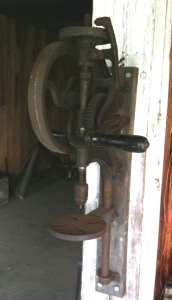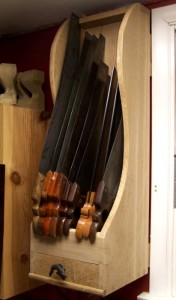Buy Your Last Tool First? I don’t think so
There is an adage that gets batted around woodworking forums a lot, “buy your last tool first”. The principle being that buying an inferior tool will only result in wasted money and lack of functionality that cause you to upgrade later. This is not a bad thought but I think there are a few things wrong with this specifically relating to hand tool woodworking.
First, “buy your last tool…” suggests that there will ever be a “last” tool. I don’t know a woodworker who doesn’t have an eye on some tool to appear on sale at a retailer or on ebay. Lately I have adopted a less is more ideal with my tool kit but that doesn’t mean I’m not diligently looking for a post drill or panel raising plane. There is no such thing as a last tool.
But enough of my glib attitude and on to my real point. This will sound wrong coming from a guy that run The Hand Tool School but hand tools are not for everybody. Anybody can learn to work with great accuracy and speed with hand tools but a lot of people just don’t want to. I’m a little crazy in that I actually enjoy milling stock by hand. That doesn’t mean that I will be selling my thickness planer anytime soon. With this in mind I hate to see this last tool first idea being given as advice to folks who are looking to “get in to hand tools” or want to “buy my first saw”.
For the woodworker looking to get started with hand tools there is much unknown. Will they stick with hand tool work or get fed up with the tedium of hand milling and buy a jointer and planer. Will they decide that hand cut dovetails don’t look different enough and buy a router jig? Will the marking, cut, fit, marking, cut, fit, etc, etc approach of hand cut tenons bore them and they buy a good miter gauge or tenon jig for their table saw instead? Imagine if these lessons are learned after the woodworker has dropped $2500 on saws, planes, marking tools, chisels, etc. (that number is quite low actually). Now the woodworker in question may gravitate back to hand tools later on and their expenditure will be worthwhile, but I have to imagine that some buyer’s remorse may creep in there or worse, the funds to buy the power tools will have come by selling off said hand tools.
I would like to think that the satisfaction from cutting joinery by hand feeds the obsession but different people are motivated by different things. If your experience is based on completing pieces then the journey may not be as important. There is also a little bit of Tim the Tool Man Taylor in all of us that yearns for the monster power tool that can rip a 32/4 piece of Maple without stuttering that draws many away from hand work.
Whatever the motivations it doesn’t matter. As I said before hand tools are not for everyone. Advising someone to start working with premium tools who has not prior experience may not be the best course of action. This is coming from someone who has been known to do just this too. There is something to be said about working with a finely tuned hand saw or plane when it comes to understanding how it should feel or how sharp it should be, but the cost that comes with that tool gives me concern especially considering that it is hard to build furniture with just 1 or 2 tools. Add together the cost of a basic tool kit and very quickly your wallet begins to sweat.
Vintage tools can be a type of gateway tool that can get someone started quickly and cheaply but some knowledge and a willingness to clean them up and tune them is necessary. Many would say this is a prerequisite skill and while I agree, the realistic side of me knows that our instant gratification society doesn’t play this way. We are seeing some mid range toolmakers creating good quality tools for less and even some makers like Lee Valley that astound me with the low prices of their saws and the high quality that comes with them. These make for a good option to get the tool in the woodworker’s hand to determine for his or her self if hand work is something they are in to.
Tool shows are a good option but not really realistic. If you are looking for a specific tool this is a great place to lay hands on and get a feel for that maker’s offering. If you have no frame of reference then it doesn’t really do much for you. We all know that there is a difference between being in your shop alone and trying to do something as compared to having an expert looking over your shoulder with a perfectly tuned tool in your hand working on non threatening stock that costs the woodworker nothing.
There are a lot of things to consider and I should shut up before I begin to ramble further, but let me just close by saying that I think the best way in to the hand tool world for the neophyte is to go as minimalistic and cheaply as possible keeping quality in mind and then to get into the shop and work. Yes there will be tools you wish you had to make a job easier, but if you pick a simple piece that you can be proud of when it is finished, I think you can gain an understanding of how much or how little you enjoy working by hand…before you spend your mortgage on tools.
Hmm sounds like a good podcast idea…
Have you ever bought the last hand tool first and regretted it?




